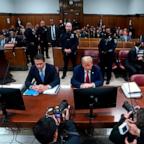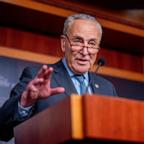Embracing the Paradox of Muhammad Ali: Gratitude to the Greatest
ABC's Matthew Dowd reflects on the lessons of Ali.
— -- When famous people pass away, it gives us all pause to examine their life and with that our own lives. We wonder what was the meaning about who they were and why does it matter. As many reflect on Muhammad Ali and the iconic figure he was for the last half of the 20th century, I would like to just touch on one part of him that might reveal a lesson for all of us.
Growing up in Detroit in the 1960s and 70s, I was a huge boxing fan. With a hockey rink named after another iconic boxer, Joe Louis, watching fights on television seemed like a natural thing to do. And there was no better viewing than the Ali-Frazier fights. Most of America was split on who they would root for -- me and most of my six brothers were Frazier fans. Frazier seemed more of a regular guy, more humble, less bragging than Ali. He always seemed like an underdog even when favored to win a fight.
It took me later in life to appreciate the many sides to Ali, and I think one of the most compelling parts of him was that he was a man of seemingly conflicting elements. There seemed such contradictions in his persona -- a pugilist and a paradox. Here was a fighter who was never viewed as the underdog, but always fought on behalf of underdogs.
Ali was an unbelievably talented fighter and was one of the greatest in the sport of boxing - probably the most violent of sports in the world. While rising to the heights of the warring sport, he was a man of peace who spoke of resolving conflict in the world. He took stands against wars at nearly every juncture internationally, speaking for peace while trying to punch out his opponent in the ring.
Ali from a young age sought fame and fortune through his talents in the sport. He constantly bragged he was the best, and strived for the big pay days whether it was financially or from fan support. And then at the prime of his career, in the sixties in the midst of the Vietnam War, he took a principled stand where he had to give up all the fame and fortune. Ali lost over three years of prime earning because he drew a line in the sand and said he wouldn't fight in Vietnam. He was driven to get earthly desires, then gave them all up for a moral imperative.
Ali grew up in Louisville, Kentucky, a product of real America, and a person who had a deep love for America and American ideals. He spoke eloquently about the goodness and beauty of America, but he also spoke of the flaws in America, and pointed out where we were wrong and where we might do better. He was distinctly American by birth, belief and bombast, but he knew that America wasn't perfect and knew we needed to change some fundamental things.
Ali was the greatest in so many ways, and he was also a human being like the rest of us. He had complicated relationships with the opposite sex and his children. He is on a pedestal for so many, and we also know he wasn't perfect. Heroes don't have to be unblemished or consistent in every aspect of their life for us to honor them or for us to learn from them. Ali was an icon with contradictions who called many to a higher purpose, while we have celebrity leaders today who devolve their contradictions into lower purposes.
For me, during this time of reflection, I am embracing the idea that a good life is one that embraces the paradox of ourselves and others. It is accepting the contradictions that we all have internally and externally. Living a life of principle, purpose and meaning isn't about being perfectly consistent. Rather it is about understanding that our own worlds and the whole world is made up of human beings. And our goal is to mesh our own complexities together in a way that lives out our highest purpose knowing that everyone of us is part saint and part sinner. And for that lesson I am grateful to the Greatest.




